Bucks University: Global Business Environment Report and Analysis
VerifiedAdded on 2023/01/19
|7
|1493
|31
Report
AI Summary
This report examines the global business environment, particularly focusing on how emerging economies offer opportunities for global expansion. The analysis explores the economic, political, and legal reforms in emerging markets like India, China, and Brazil that attract foreign investment by increasing accessibility to finances and creating conducive environments for innovation. The report also delves into how governments utilize fiscal and monetary policies to stimulate economic activity and growth. Monetary policies, such as lowering interest rates, and fiscal policies, including tax reductions and increased government spending, are discussed with examples. The report highlights how these policies influence money supply, purchasing power, demand, production, and employment, ultimately impacting the economy's growth trajectory. The provided examples from research illustrate the practical application of these policies.
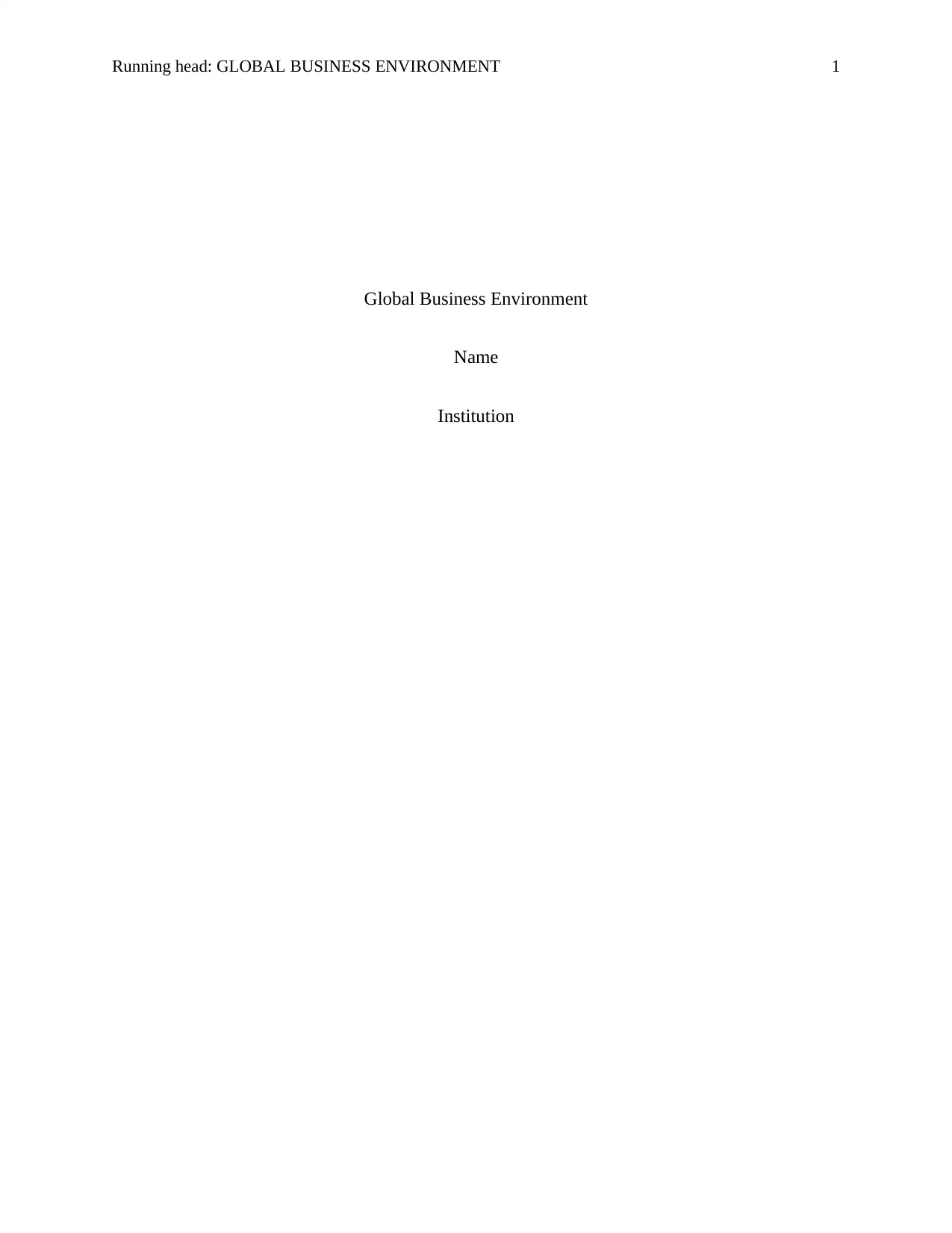
Running head: GLOBAL BUSINESS ENVIRONMENT 1
Global Business Environment
Name
Institution
Global Business Environment
Name
Institution
Paraphrase This Document
Need a fresh take? Get an instant paraphrase of this document with our AI Paraphraser
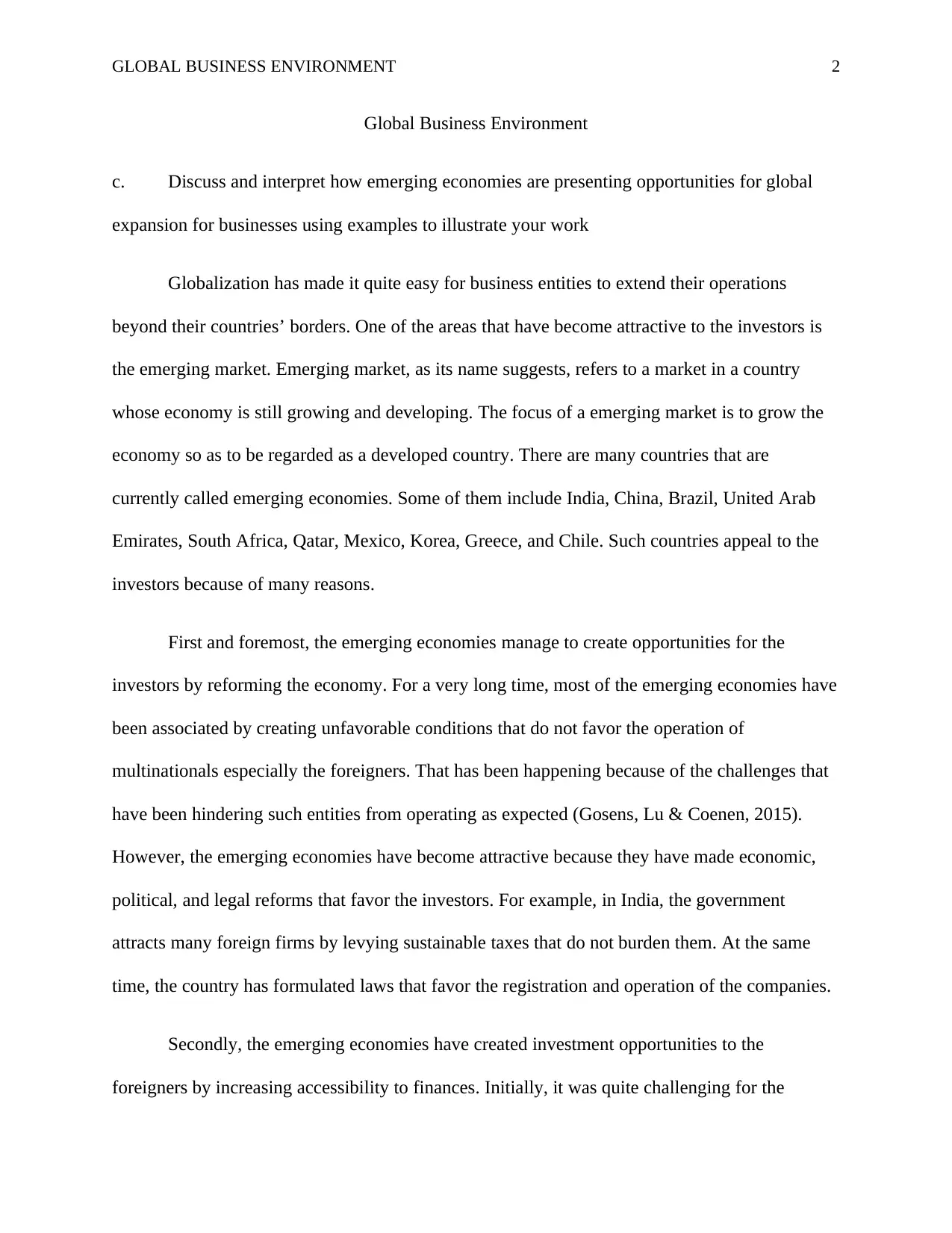
GLOBAL BUSINESS ENVIRONMENT 2
Global Business Environment
c. Discuss and interpret how emerging economies are presenting opportunities for global
expansion for businesses using examples to illustrate your work
Globalization has made it quite easy for business entities to extend their operations
beyond their countries’ borders. One of the areas that have become attractive to the investors is
the emerging market. Emerging market, as its name suggests, refers to a market in a country
whose economy is still growing and developing. The focus of a emerging market is to grow the
economy so as to be regarded as a developed country. There are many countries that are
currently called emerging economies. Some of them include India, China, Brazil, United Arab
Emirates, South Africa, Qatar, Mexico, Korea, Greece, and Chile. Such countries appeal to the
investors because of many reasons.
First and foremost, the emerging economies manage to create opportunities for the
investors by reforming the economy. For a very long time, most of the emerging economies have
been associated by creating unfavorable conditions that do not favor the operation of
multinationals especially the foreigners. That has been happening because of the challenges that
have been hindering such entities from operating as expected (Gosens, Lu & Coenen, 2015).
However, the emerging economies have become attractive because they have made economic,
political, and legal reforms that favor the investors. For example, in India, the government
attracts many foreign firms by levying sustainable taxes that do not burden them. At the same
time, the country has formulated laws that favor the registration and operation of the companies.
Secondly, the emerging economies have created investment opportunities to the
foreigners by increasing accessibility to finances. Initially, it was quite challenging for the
Global Business Environment
c. Discuss and interpret how emerging economies are presenting opportunities for global
expansion for businesses using examples to illustrate your work
Globalization has made it quite easy for business entities to extend their operations
beyond their countries’ borders. One of the areas that have become attractive to the investors is
the emerging market. Emerging market, as its name suggests, refers to a market in a country
whose economy is still growing and developing. The focus of a emerging market is to grow the
economy so as to be regarded as a developed country. There are many countries that are
currently called emerging economies. Some of them include India, China, Brazil, United Arab
Emirates, South Africa, Qatar, Mexico, Korea, Greece, and Chile. Such countries appeal to the
investors because of many reasons.
First and foremost, the emerging economies manage to create opportunities for the
investors by reforming the economy. For a very long time, most of the emerging economies have
been associated by creating unfavorable conditions that do not favor the operation of
multinationals especially the foreigners. That has been happening because of the challenges that
have been hindering such entities from operating as expected (Gosens, Lu & Coenen, 2015).
However, the emerging economies have become attractive because they have made economic,
political, and legal reforms that favor the investors. For example, in India, the government
attracts many foreign firms by levying sustainable taxes that do not burden them. At the same
time, the country has formulated laws that favor the registration and operation of the companies.
Secondly, the emerging economies have created investment opportunities to the
foreigners by increasing accessibility to finances. Initially, it was quite challenging for the
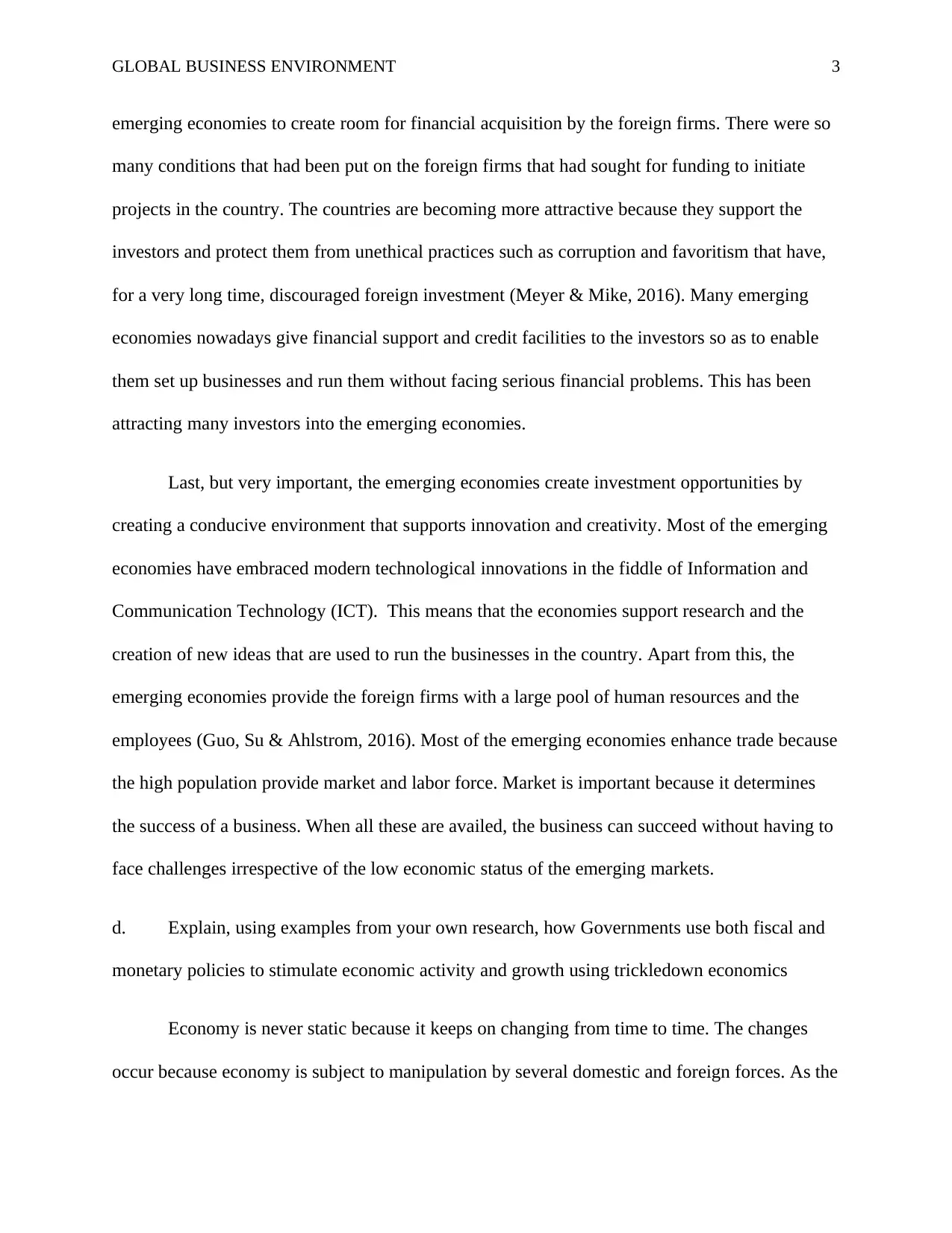
GLOBAL BUSINESS ENVIRONMENT 3
emerging economies to create room for financial acquisition by the foreign firms. There were so
many conditions that had been put on the foreign firms that had sought for funding to initiate
projects in the country. The countries are becoming more attractive because they support the
investors and protect them from unethical practices such as corruption and favoritism that have,
for a very long time, discouraged foreign investment (Meyer & Mike, 2016). Many emerging
economies nowadays give financial support and credit facilities to the investors so as to enable
them set up businesses and run them without facing serious financial problems. This has been
attracting many investors into the emerging economies.
Last, but very important, the emerging economies create investment opportunities by
creating a conducive environment that supports innovation and creativity. Most of the emerging
economies have embraced modern technological innovations in the fiddle of Information and
Communication Technology (ICT). This means that the economies support research and the
creation of new ideas that are used to run the businesses in the country. Apart from this, the
emerging economies provide the foreign firms with a large pool of human resources and the
employees (Guo, Su & Ahlstrom, 2016). Most of the emerging economies enhance trade because
the high population provide market and labor force. Market is important because it determines
the success of a business. When all these are availed, the business can succeed without having to
face challenges irrespective of the low economic status of the emerging markets.
d. Explain, using examples from your own research, how Governments use both fiscal and
monetary policies to stimulate economic activity and growth using trickledown economics
Economy is never static because it keeps on changing from time to time. The changes
occur because economy is subject to manipulation by several domestic and foreign forces. As the
emerging economies to create room for financial acquisition by the foreign firms. There were so
many conditions that had been put on the foreign firms that had sought for funding to initiate
projects in the country. The countries are becoming more attractive because they support the
investors and protect them from unethical practices such as corruption and favoritism that have,
for a very long time, discouraged foreign investment (Meyer & Mike, 2016). Many emerging
economies nowadays give financial support and credit facilities to the investors so as to enable
them set up businesses and run them without facing serious financial problems. This has been
attracting many investors into the emerging economies.
Last, but very important, the emerging economies create investment opportunities by
creating a conducive environment that supports innovation and creativity. Most of the emerging
economies have embraced modern technological innovations in the fiddle of Information and
Communication Technology (ICT). This means that the economies support research and the
creation of new ideas that are used to run the businesses in the country. Apart from this, the
emerging economies provide the foreign firms with a large pool of human resources and the
employees (Guo, Su & Ahlstrom, 2016). Most of the emerging economies enhance trade because
the high population provide market and labor force. Market is important because it determines
the success of a business. When all these are availed, the business can succeed without having to
face challenges irrespective of the low economic status of the emerging markets.
d. Explain, using examples from your own research, how Governments use both fiscal and
monetary policies to stimulate economic activity and growth using trickledown economics
Economy is never static because it keeps on changing from time to time. The changes
occur because economy is subject to manipulation by several domestic and foreign forces. As the
⊘ This is a preview!⊘
Do you want full access?
Subscribe today to unlock all pages.

Trusted by 1+ million students worldwide
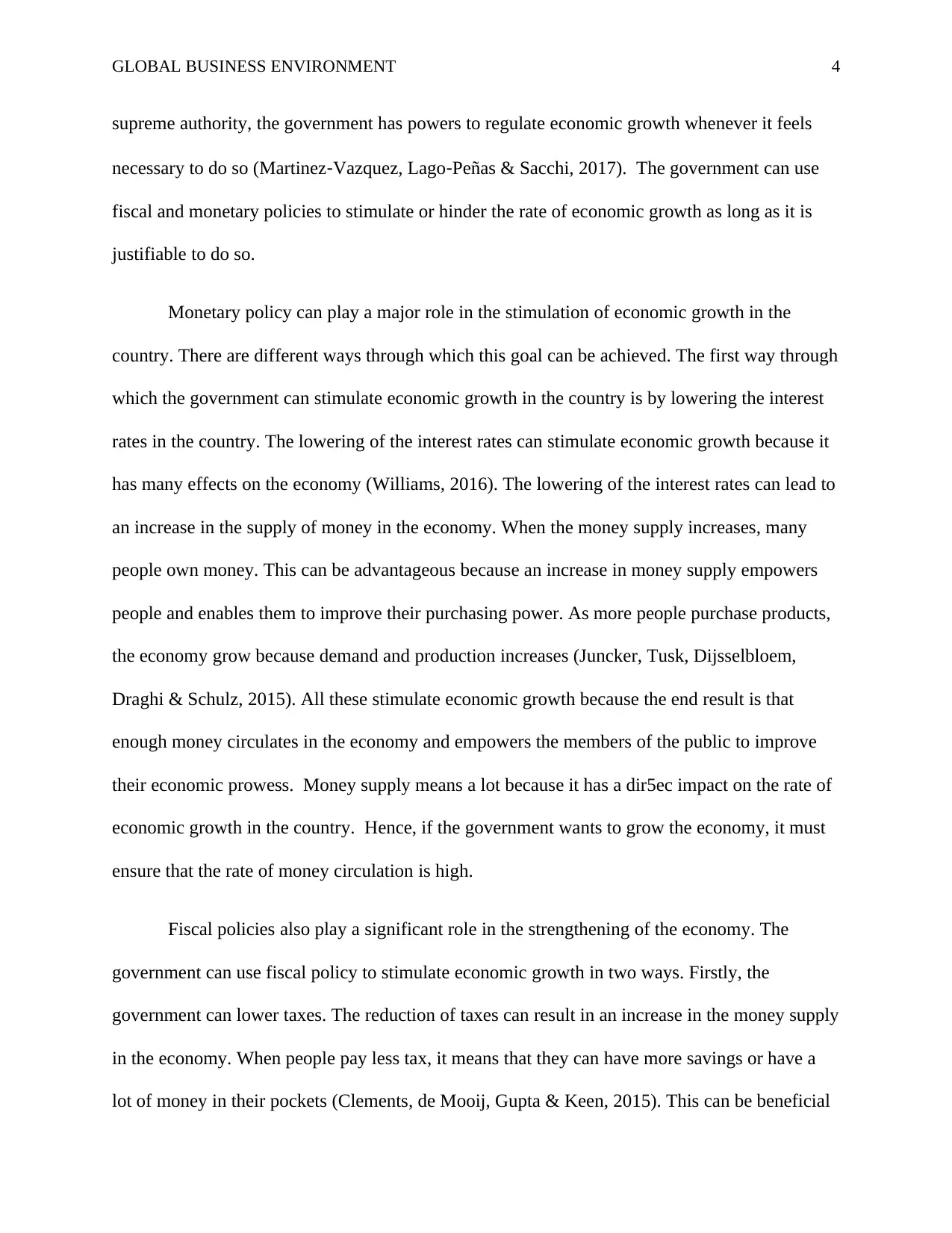
GLOBAL BUSINESS ENVIRONMENT 4
supreme authority, the government has powers to regulate economic growth whenever it feels
necessary to do so (Martinez‐Vazquez, Lago‐Peñas & Sacchi, 2017). The government can use
fiscal and monetary policies to stimulate or hinder the rate of economic growth as long as it is
justifiable to do so.
Monetary policy can play a major role in the stimulation of economic growth in the
country. There are different ways through which this goal can be achieved. The first way through
which the government can stimulate economic growth in the country is by lowering the interest
rates in the country. The lowering of the interest rates can stimulate economic growth because it
has many effects on the economy (Williams, 2016). The lowering of the interest rates can lead to
an increase in the supply of money in the economy. When the money supply increases, many
people own money. This can be advantageous because an increase in money supply empowers
people and enables them to improve their purchasing power. As more people purchase products,
the economy grow because demand and production increases (Juncker, Tusk, Dijsselbloem,
Draghi & Schulz, 2015). All these stimulate economic growth because the end result is that
enough money circulates in the economy and empowers the members of the public to improve
their economic prowess. Money supply means a lot because it has a dir5ec impact on the rate of
economic growth in the country. Hence, if the government wants to grow the economy, it must
ensure that the rate of money circulation is high.
Fiscal policies also play a significant role in the strengthening of the economy. The
government can use fiscal policy to stimulate economic growth in two ways. Firstly, the
government can lower taxes. The reduction of taxes can result in an increase in the money supply
in the economy. When people pay less tax, it means that they can have more savings or have a
lot of money in their pockets (Clements, de Mooij, Gupta & Keen, 2015). This can be beneficial
supreme authority, the government has powers to regulate economic growth whenever it feels
necessary to do so (Martinez‐Vazquez, Lago‐Peñas & Sacchi, 2017). The government can use
fiscal and monetary policies to stimulate or hinder the rate of economic growth as long as it is
justifiable to do so.
Monetary policy can play a major role in the stimulation of economic growth in the
country. There are different ways through which this goal can be achieved. The first way through
which the government can stimulate economic growth in the country is by lowering the interest
rates in the country. The lowering of the interest rates can stimulate economic growth because it
has many effects on the economy (Williams, 2016). The lowering of the interest rates can lead to
an increase in the supply of money in the economy. When the money supply increases, many
people own money. This can be advantageous because an increase in money supply empowers
people and enables them to improve their purchasing power. As more people purchase products,
the economy grow because demand and production increases (Juncker, Tusk, Dijsselbloem,
Draghi & Schulz, 2015). All these stimulate economic growth because the end result is that
enough money circulates in the economy and empowers the members of the public to improve
their economic prowess. Money supply means a lot because it has a dir5ec impact on the rate of
economic growth in the country. Hence, if the government wants to grow the economy, it must
ensure that the rate of money circulation is high.
Fiscal policies also play a significant role in the strengthening of the economy. The
government can use fiscal policy to stimulate economic growth in two ways. Firstly, the
government can lower taxes. The reduction of taxes can result in an increase in the money supply
in the economy. When people pay less tax, it means that they can have more savings or have a
lot of money in their pockets (Clements, de Mooij, Gupta & Keen, 2015). This can be beneficial
Paraphrase This Document
Need a fresh take? Get an instant paraphrase of this document with our AI Paraphraser
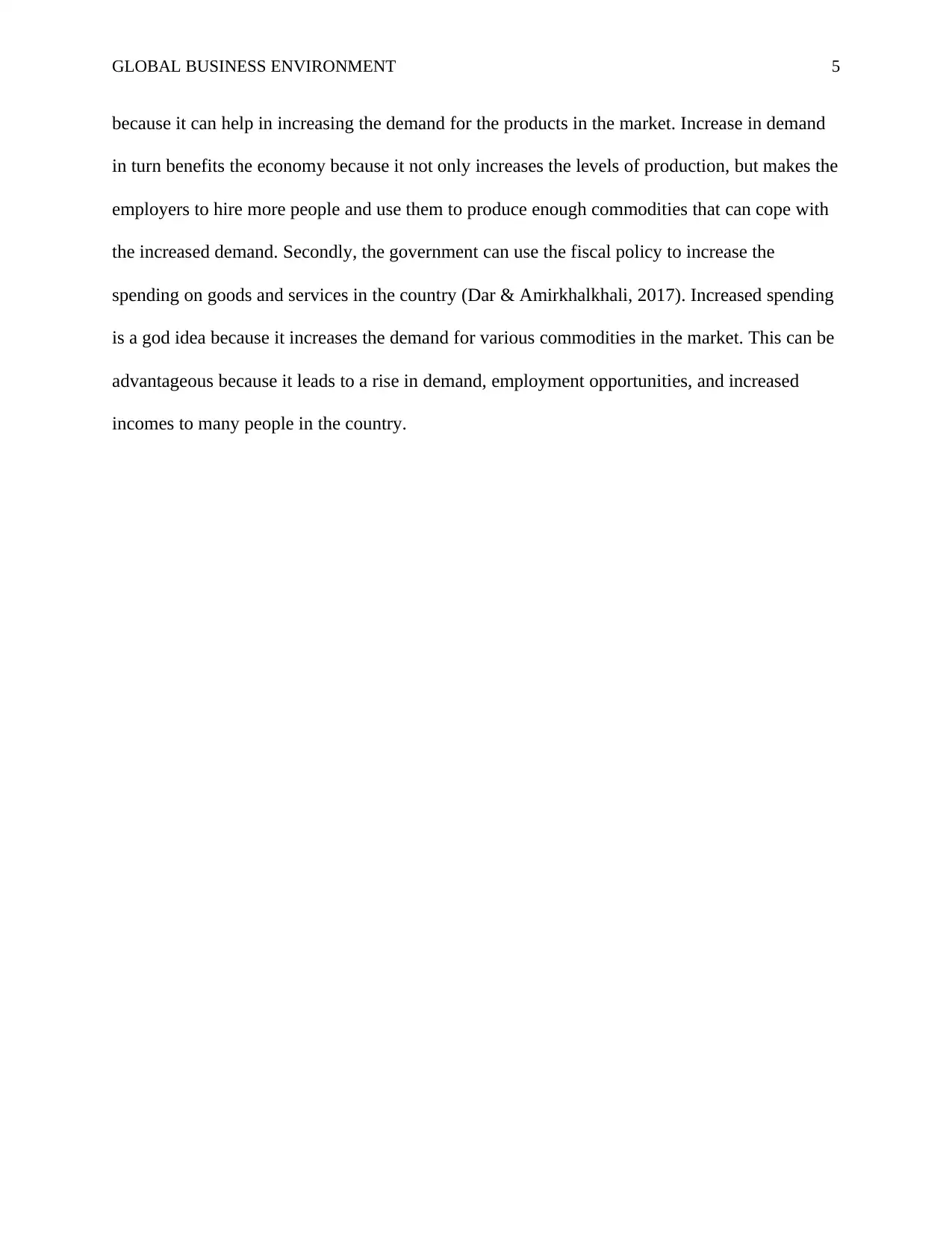
GLOBAL BUSINESS ENVIRONMENT 5
because it can help in increasing the demand for the products in the market. Increase in demand
in turn benefits the economy because it not only increases the levels of production, but makes the
employers to hire more people and use them to produce enough commodities that can cope with
the increased demand. Secondly, the government can use the fiscal policy to increase the
spending on goods and services in the country (Dar & Amirkhalkhali, 2017). Increased spending
is a god idea because it increases the demand for various commodities in the market. This can be
advantageous because it leads to a rise in demand, employment opportunities, and increased
incomes to many people in the country.
because it can help in increasing the demand for the products in the market. Increase in demand
in turn benefits the economy because it not only increases the levels of production, but makes the
employers to hire more people and use them to produce enough commodities that can cope with
the increased demand. Secondly, the government can use the fiscal policy to increase the
spending on goods and services in the country (Dar & Amirkhalkhali, 2017). Increased spending
is a god idea because it increases the demand for various commodities in the market. This can be
advantageous because it leads to a rise in demand, employment opportunities, and increased
incomes to many people in the country.
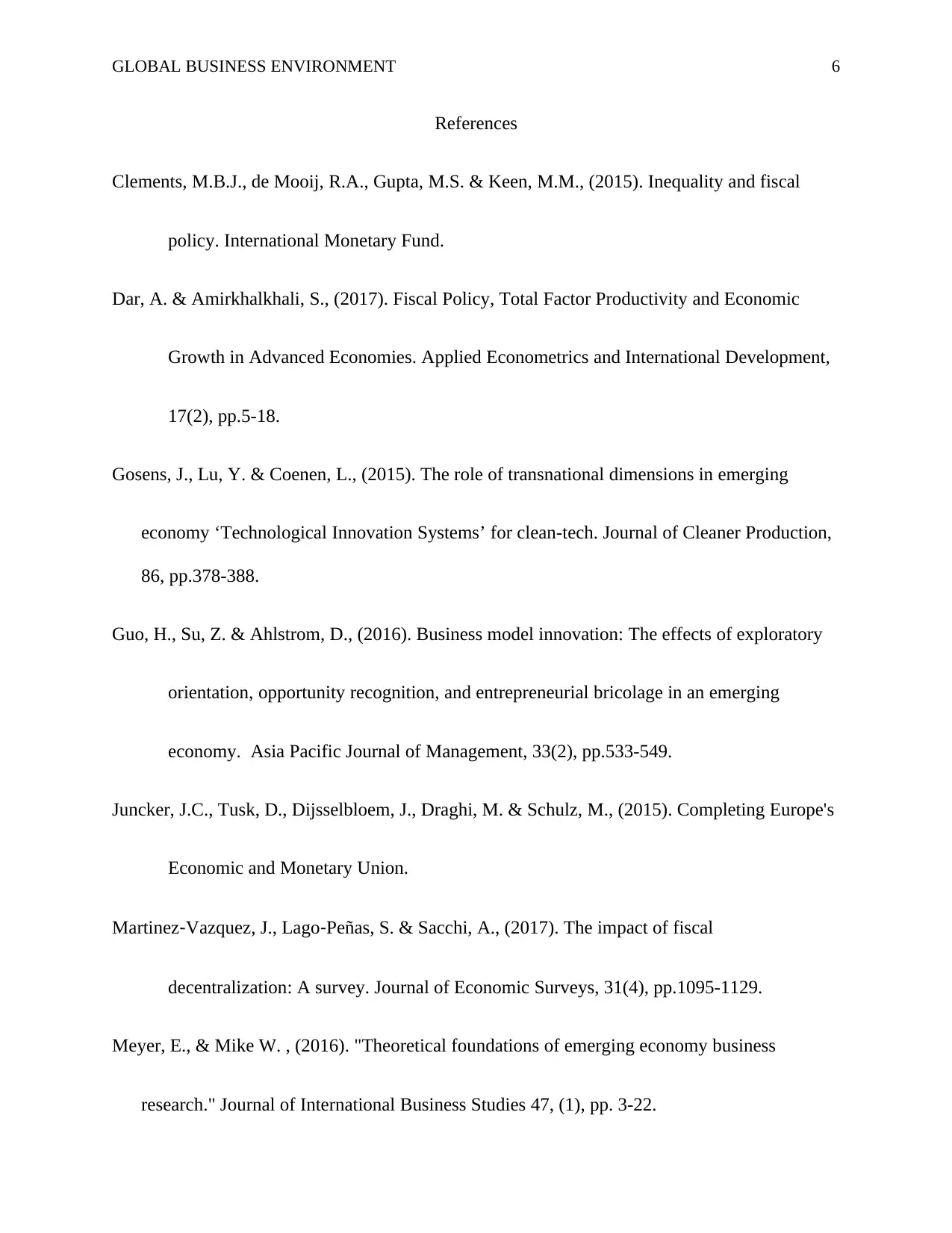
GLOBAL BUSINESS ENVIRONMENT 6
References
Clements, M.B.J., de Mooij, R.A., Gupta, M.S. & Keen, M.M., (2015). Inequality and fiscal
policy. International Monetary Fund.
Dar, A. & Amirkhalkhali, S., (2017). Fiscal Policy, Total Factor Productivity and Economic
Growth in Advanced Economies. Applied Econometrics and International Development,
17(2), pp.5-18.
Gosens, J., Lu, Y. & Coenen, L., (2015). The role of transnational dimensions in emerging
economy ‘Technological Innovation Systems’ for clean-tech. Journal of Cleaner Production,
86, pp.378-388.
Guo, H., Su, Z. & Ahlstrom, D., (2016). Business model innovation: The effects of exploratory
orientation, opportunity recognition, and entrepreneurial bricolage in an emerging
economy. Asia Pacific Journal of Management, 33(2), pp.533-549.
Juncker, J.C., Tusk, D., Dijsselbloem, J., Draghi, M. & Schulz, M., (2015). Completing Europe's
Economic and Monetary Union.
Martinez‐Vazquez, J., Lago‐Peñas, S. & Sacchi, A., (2017). The impact of fiscal
decentralization: A survey. Journal of Economic Surveys, 31(4), pp.1095-1129.
Meyer, E., & Mike W. , (2016). "Theoretical foundations of emerging economy business
research." Journal of International Business Studies 47, (1), pp. 3-22.
References
Clements, M.B.J., de Mooij, R.A., Gupta, M.S. & Keen, M.M., (2015). Inequality and fiscal
policy. International Monetary Fund.
Dar, A. & Amirkhalkhali, S., (2017). Fiscal Policy, Total Factor Productivity and Economic
Growth in Advanced Economies. Applied Econometrics and International Development,
17(2), pp.5-18.
Gosens, J., Lu, Y. & Coenen, L., (2015). The role of transnational dimensions in emerging
economy ‘Technological Innovation Systems’ for clean-tech. Journal of Cleaner Production,
86, pp.378-388.
Guo, H., Su, Z. & Ahlstrom, D., (2016). Business model innovation: The effects of exploratory
orientation, opportunity recognition, and entrepreneurial bricolage in an emerging
economy. Asia Pacific Journal of Management, 33(2), pp.533-549.
Juncker, J.C., Tusk, D., Dijsselbloem, J., Draghi, M. & Schulz, M., (2015). Completing Europe's
Economic and Monetary Union.
Martinez‐Vazquez, J., Lago‐Peñas, S. & Sacchi, A., (2017). The impact of fiscal
decentralization: A survey. Journal of Economic Surveys, 31(4), pp.1095-1129.
Meyer, E., & Mike W. , (2016). "Theoretical foundations of emerging economy business
research." Journal of International Business Studies 47, (1), pp. 3-22.
⊘ This is a preview!⊘
Do you want full access?
Subscribe today to unlock all pages.

Trusted by 1+ million students worldwide

GLOBAL BUSINESS ENVIRONMENT 7
Williams, J.C., (2016). Monetary policy in a low R-star world. FRBSF Economic Letter, 23,
pp.1-
23.
Williams, J.C., (2016). Monetary policy in a low R-star world. FRBSF Economic Letter, 23,
pp.1-
23.
1 out of 7
Related Documents
Your All-in-One AI-Powered Toolkit for Academic Success.
+13062052269
info@desklib.com
Available 24*7 on WhatsApp / Email
![[object Object]](/_next/static/media/star-bottom.7253800d.svg)
Unlock your academic potential
Copyright © 2020–2026 A2Z Services. All Rights Reserved. Developed and managed by ZUCOL.





